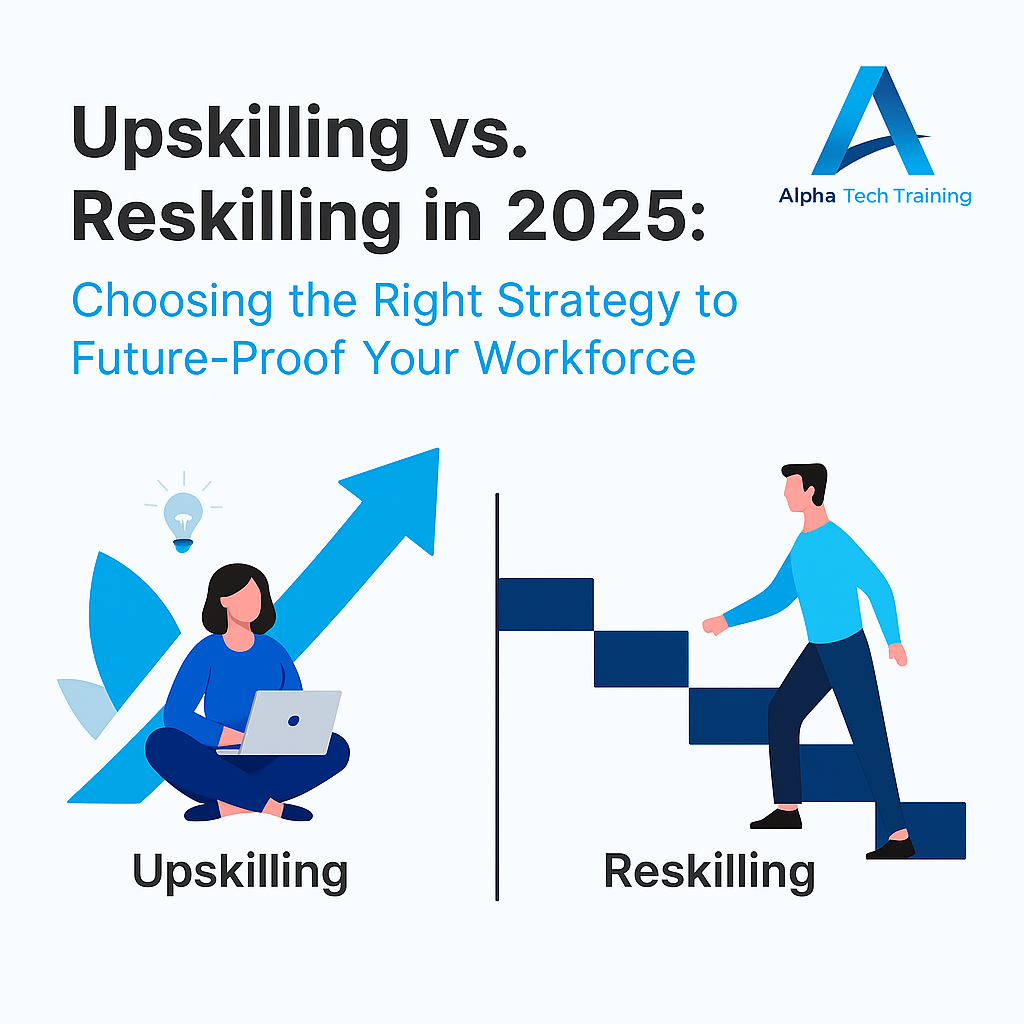As we step further into the era of rapid digital transformation, artificial intelligence, and hybrid work models, the nature of work continues to evolve. The biggest asset any organization has today is not its infrastructure or capital—it’s its people. But in a world where skills become obsolete in just a few years, the pressing question remains: Should you upskill or reskill your workforce in 2025?
In this comprehensive guide, we’ll explore the definitions, differences, use cases, benefits, and strategic approaches to both upskilling and reskilling. Backed by research and real-world examples, we’ll also introduce how companies like Alpha Tech Training help global organizations prepare their teams for the future.
Understanding the Basics: What is Upskilling and Reskilling?
Upskilling: Deepening Existing Skills
Upskilling refers to teaching employees new skills to enhance their current role or help them grow within their existing domain. For example, a digital marketer learning data analytics or AI-based campaign optimization tools is undergoing upskilling.
Reskilling: Learning for a New Role
Reskilling involves training employees with new skills to take on different roles—especially when their current positions may become redundant. A graphic designer learning front-end web development or a customer service executive transitioning to a CRM analyst is an example of reskilling.
Why These Concepts Matter More in 2025
- AI and Automation: Technologies like AI, RPA, and machine learning are automating repetitive tasks, making some jobs obsolete while creating demand for new roles.
- Talent Shortage: According to a 2024 LinkedIn report, 75% of companies in India report a skills gap. Hiring externally is costly and slow.
- Workforce Agility: Businesses need adaptable talent who can shift focus quickly as market demands evolve.
- Employee Retention: Providing learning opportunities through upskilling and reskilling improves job satisfaction and loyalty.
Companies like Alpha Tech Training recognize these trends and offer customized learning paths to prepare both individuals and enterprises for what’s next.
Key Differences Between Upskilling and Reskilling
| Feature | Upskilling | Reskilling |
| Goal | Improve performance in the current role | Prepare for a different/new role |
| Focus | Deepening current skill set | Learning entirely new skills |
| Timeframe | Typically shorter and incremental | Usually longer and more intensive |
| Application | Leadership development, technical mastery | Job role transition, business model changes |
| Use Cases | Promoting internal mobility | Avoiding layoffs through retraining |
When to Upskill vs. When to Reskill
Opt for Upskilling When:
- Your industry is evolving, not transforming.
- You aim to improve internal promotion rates.
- There’s a performance gap in existing functions.
- Your employees want vertical growth.
Opt for Reskilling When:
- You’re undergoing digital transformation.
- Job roles are being automated.
- You want to retain employees instead of layoffs.
- You’re expanding into new service lines.
Alpha Tech Training helps evaluate your current organizational structure and employee capabilities to design effective training interventions.
Top Industries Prioritizing Upskilling and Reskilling in 2025
- Information Technology: Upskilling in AI/ML, cybersecurity, and cloud computing.
- Banking & Finance: Reskilling for data science, blockchain, and digital banking tools.
- Healthcare: Upskilling in telemedicine, EMR systems, and digital patient engagement.
- Manufacturing: Reskilling due to automation and Industry 4.0 technologies.
- Retail & E-Commerce: Reskilling for digital logistics and omnichannel strategy.
Benefits of Upskilling and Reskilling
For Employers
- Increased productivity and efficiency
- Higher employee retention and satisfaction
- Competitive advantage in a tech-driven market
- Reduction in hiring and onboarding costs
For Employees
- Career growth and job security
- Adaptability in a changing environment
- Higher earning potential
- Improved confidence and motivation
The Role of L&D Teams and Training Providers
Learning & Development (L&D) departments play a pivotal role in identifying skills gaps, evaluating job role evolution, and implementing training programs. However, external partners like Alpha Tech Training bring:
- Industry-aligned curriculum
- Certified trainers with practical experience
- Flexible training formats (virtual, classroom, on-site)
- Real-time assessments and progress tracking
- Customized modules based on company needs
Alpha Tech Training: Your Partner in Workforce Transformation
At Alpha Tech Training, we specialize in:
- IT & Functional Training: Upskill employees in project management, IT tools, cloud, DevOps, and software testing.
- Corporate Training: Soft skills, communication, and leadership development.
- Custom Programs: Based on client goals, tech stack, and industry trends.
Visit Alpha Tech Training to explore our services or request a consultation.
Success Stories
Case Study: Upskilling a Tech Support Team
A leading software company partnered with Alpha Tech Training to upskill their tech support team in cloud technologies (AWS & Azure). Within 6 months:
- Internal ticket resolution improved by 38%
- Two team members transitioned to DevOps roles
- Employee satisfaction score increased by 26%
Case Study: Reskilling for Automation
A logistics firm was phasing out manual entry roles due to ERP implementation. Rather than laying off 50 employees, they reskilled them in SAP, inventory management, and data analytics. Result:
- 92% of the employees were retained
- Operational errors dropped by 45%
- ROI on training was achieved in 4 months
How to Design an Effective Upskilling/Reskilling Strategy
- Assess Skills Gaps: Use surveys, performance reviews, and analytics.
- Segment the Workforce: Identify roles that need upskilling vs. reskilling.
- Define Goals: Are you aiming for innovation, efficiency, or cost-cutting?
- Create Personalized Learning Paths: Not all employees learn the same way.
- Choose the Right Partner: Work with experienced providers like Alpha Tech Training.
- Track Progress: Use KPIs and assessments to measure impact.
The Future of Upskilling and Reskilling
Integration with AI and Data Analytics
Smart L&D platforms now offer AI-powered recommendations for personalized learning journeys.
Microlearning and Gamification
Bite-sized, engaging formats that boost retention and learner satisfaction.
Immersive Learning (AR/VR)
Industries like manufacturing and healthcare are adopting VR-based simulations for skill development.
Certification & Credentialing
Digital badges and blockchain-verified certificates help track lifelong learning.
Lifelong Learning Culture
Companies that embed continuous learning into their culture see better employee engagement and innovation.
Conclusion
In 2025, the choice between upskilling and reskilling is not binary—it’s strategic. Both serve vital purposes in navigating the future of work. What matters most is a proactive approach that aligns employee growth with business needs.
Alpha Tech Training helps organizations like yours stay ahead with custom training programs designed to build resilient, future-ready teams.
🌐 Visit Alpha Tech Training to learn more or request a free consultation.
Don’t wait for change—train for it.



